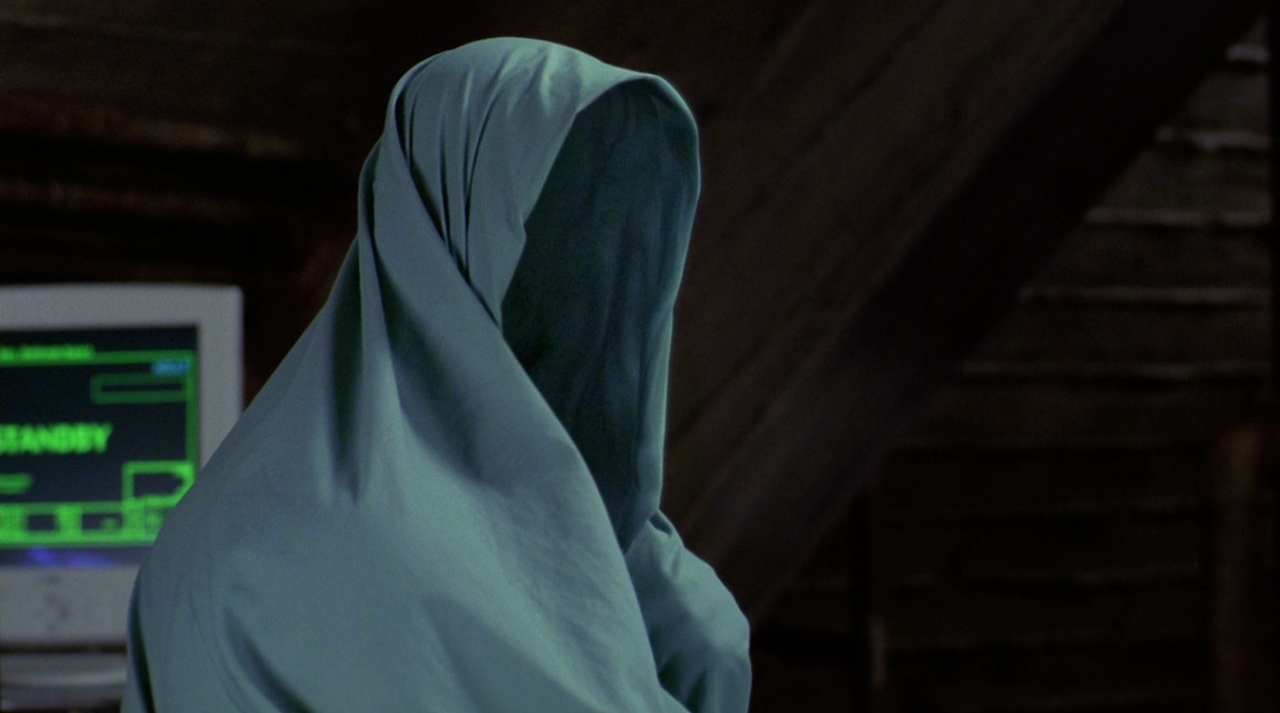

Paul Verhoeven
By Carter Neuschafer
February 11, 2025
"Hollow Man" is Paul Verhoeven's $100M spin on H.G. Wells' story "The Invisible Man", fitted with the typical Verhoeven bells and whistles (the bells being high-concept futuristic technology and the whistles being his acute political commentary). It follows Sebastian, played by Kevin Bacon, a self-proclaimed tech genius, charismatic player, and God. He leads a team of cookie-cutter scientists as they code the genetic transformation to invisibility, and then back to visibility. Things go wrong after Sebastian volunteers to test the serum on himself, and the solution to turn him visible fails. After days of invisibility, Sebastian displays his true intentions as he enacts his sexual and egotistical fantasies on his comrades and the world above the underground lab.

The film begins in Sebastian's apartment while he performs his role as the genius. He is working on the cure for invisibility, a potion that brings back the visibility of its user. He flies down from his Holy masterpiece to distract himself with human pleasures: his lamplit office, his scantily clad neighbor who he spies on from his window, and twinkies (which were Kevin Bacon's least favorite part of shooting "Hollow Man", he groans in his commentary). The homages Verhoeven pays to the classic thriller directors are explicit, with the visual reference here to Hitchcock's Rear Window, as stated by writer Andrew Marlowe. Sebastian is taken back to his divine work when he looks up to see his "You Should Be Working" tapestry shoddily taped to the ceiling space above his desk. This is the first overt allusion to Sebastian's inner teenage masculinity, one which will later go on to explain his violence in the second half. But it's not just Sebastian who acts like this, "Hollow Man" is a teenage movie in its father's suit. Sneaking around---both sexually by Sebastian's ex-lover and collaborator Linda, and also literally by Sebastian after his transformation---is one of the favorite teenage behavioral tendencies of our characters. Sebastian is surrounded by a sitcom-like troop, containing caricatures such as a buff and friendly rival (who could never emasculate Sebastian, despite the position he puts him in), a nemesis in a snappy redhead who knows better than to trust Sebastian but still plays along with his shenanigans, and a helpful but simple member who plays with yoyos and adult magazines. It's hard not to see how Sebastian could assume the role of God among these worshippers. Sebastian makes a breakthrough in his room that night and brings the team to the lab, where the subject of the test, an invisible gorilla named Isabelle, is waiting in her cage. She claws at Sebastian's friend---and Linda's secret suitor---before escaping the enclosure.

With their thermal goggles equipped, Sebastian and Matt begin a playful competition as to who can capture her the fastest. "She's been more aggressive these last few days." "That's what tranquilizers are for." Sebastian says. "Ten bucks says I nail her first." Without the image in front of us, Sebastian sounds like he is a rapist frat bro. This isn't the case, so we assume that without the image, our perception is obscured, but is that true?
Sebastian's coworkers play along with his narcissistic games and allow him to get away with much more than they should, but to him it's never just a game. He is his own God, and here are his disciples. His trial run on Isabelle was a success, and he is patted on the back and congratulated for his achievement. Sebastian yearns after this power of invisibility for himself. He questions an invisible dog "What's it like?" before letting him lick his face in an uncomfortable moment. A more uncomfortable and one of the most jarring moments in the film comes after he does accomplish this, when, driven to anger by the non-stop barking, opens the door and slams the dog against the kennel wall, killing him. This gesture of affection from the dog was not enough to override Sebastian's violence, and that affection will turn to violence again and again throughout the film.
The earlier connection to adolescent vanity isn't hidden in the subtext of the film, it is stated outright. The Military General that Sebastian and his team report (or hide) their successes to was Sebastian's teacher in school. Sebastian's lab is given the comradery of a high school friend group and his romance is naive and one-sided. He retains the high school aged sexual fantasy of becoming invisible, only for him it can become a reality. In fact, up until he tests the serum on himself, he spends 40 minutes living a melodrama. He receives accolades for his scientific endeavors, makes his teacher proud, and (almost) wins back the girl. Only once he cannot be seen do his morals become apparent to the world.

Sebastian's self applied invisibility serum works as expected, and now he is free to walk naked around the lab whenever and however he pleases. Verhoeven says in the commentary that he originally wanted the thermal goggles to reveal Kevin Bacon's erect penis as he walked through the halls, but couldn't keep both that and the R-rating, so he chose the latter.
One of the scientists makes a comment in passing about the nefarious reasons why the government wants this technology, and that they should be thankful for Sebastian's perversion. This notion that the United States military yields a fate worse than rape is one that I wish was explored further.
The attempt to bring Sebastian back fails, and he is left to his own mind for days. He escapes the compound and ventures off into the city, doing the classic invisible activities. He uses his skin-face-mask to scare little kids and to creep on his female neighbor. In his apartment, he performs once again. He is debating whether or not to enter the womans apartment while invisible, and acts appalled that he would think of something so dastardly. His skin-gloved-hand shakes in the mirror as he looks at his reflection, before making his decision. He takes off the glove and we are meant to assume his hand is still shaking, but it is left unknown. Is his morality phony? Or is he truly surprised by where his mind will wander when allowed to?
Sebastian enters her apartment and watches her before descending on her naked body. His ego can't allow him to experience this moment in silence, he must leave his mark on her. His next subjects are Linda and Matt, who share a bedroom and a window. Sebastian can't believe he was betrayed like this. After they learn of his escape, they are forced to tell the General the truth, which incriminates them and Sebastian for withholding and misusing information. The climax of the film takes place once he has locked his friends in the lab, and begins to enact his escape route by exterminating them in a timed explosion. He fights, kills, and rapes his way into the elevator leaving only Linda and Matthew. Sebastian as God meets his biblical end as the elevator doors are closing and Linda sets him on fire. The flames melt his synthetic skin and clothes off and all that is left is an invisible but charred Sebastian. He rises from the ashes, not as God but as Lucifer, and all of his final minutes are spent trying to give damnation to Matt and Linda. Sebastian as Lucifer is no longer driven by self-preservation but now sabotage and murder. He is sent into the flaming elevator shaft after forcing a kiss onto Linda, and she gets to walk away with Matt from Sebastian's fiery Hell.
